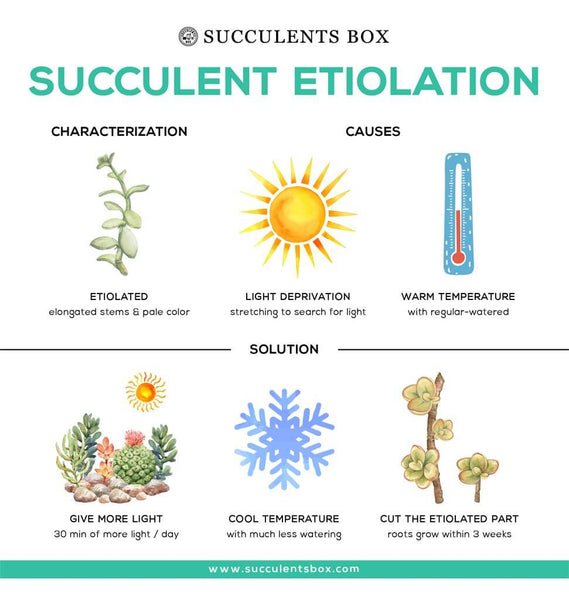One of the more common problems of succulents is etiolation caused by lack of light, which results in a “leggy” succulents with longer stem, paler and less condensed leaves. Succulents growing tall or stretched out succulents are warning sign and there’re plenty of ways to “fix” the plant before things get worse. Here’s everything you need to know about etiolation.
What is etiolation

Etiolation by dictionary term is a pathological condition of plants that grow in places that provide insufficient light, as under stones. It is characterized by stretched stems, weak growth and pale color due to lack of chlorophyll.
What causes succulent etiolation
Etiolation is usually a signal of light deprivation but it also can also be about temperature and the amount of light and water a succulent receives. If the plant is kept warm, then a regular-watered plant without enough light will also stretch as the plant was tricked into thinking it’s growing season, resulting in new growth searching for light. While at the same temperature, with less watering the plant still stretches out new growth and takes moisture from older leaves and stems leading to an unhealthier and worse-looking plant.
Thus a temporary solution for succulents growing tall and stretching is to keep your plant in cool temperature with much less watering. This will trick the plant into thinking it’s dormant season and it’ll stop new growth.
Succulents that are light sensitive

Photo credit: @plant_joy on Instagram
Most succulents will grow “leggy” if they don’t get enough light. But those succulents that change colors when stressed are usually more light sensitive than others. Their reaction can be quick, putting out etiolated “growth” in a mere few days. And aesthetically speaking, rosette-shaped succulents like Echeveria, Graptoveria and Graptosedum would look worse if stretched out.
Etiolation vs Healthy growth
While etiolation can be common, it’s important to distinguish between etiolation and healthy growth of a succulent. The easiest way to differentiate them is to look at the color and the space between the leaves, a healthy succulent will have more condense leaves and vibrant colors (For colorful succulents, dark green leaves are also considered healthy, only fading or paler leaves will be considered unhealthy). And if you’re still concerned, you can check on the plant description to see how tall the plant can be to estimate if the growth is healthy or unhealthy.
How to “fix” succulent etiolation
When a succulent is stretched out, there’s no going back, the succulent won’t revert back to looking the same as before etiolation. A few adjustments would bring the plant back to health, but aesthetically, if you’d like to have a better looking plant then there are a few things you can do to “fix” it.
It’s the intuitive solution, however your succulent need to be adjusted to brighter light gradually. Give them 30 minutes of more light per day every third day while keeping a close watch on them. If the plant seems to stop stretching but still have a few leaves pointing down, continue to add more light until the plant stops showing signs of stress. Meanwhile if the leaves show brown spots it means the plant is sunburnt and the adjustment is too quick for the plant to adapt, thus slowing down the process should solve the issue. If your plants are indoor without much chance of getting more sunlight, consider using a grow light to give your succulent the light they need.

After nursing the plant back to its normal health and making sure it is getting adequate sunlight, if for aesthetical reasons, you still want to “fix” the plant, then you could cut the etiolated part and start to grow a new plant from that cutting.
The cutting should start to grow roots within 2-3 weeks and the original base plant also will grow new offshoots from the cutoff stem too. This way you can “groom” the new plants to grow properly and even get more plants from the old etiolated plant. For more details on propagation from cuttings, read our blog here.

See more about Troubleshooting Common Problems for Succulents
For Types of Succulents Careguide. Read more information here.
And get a free plant when your friends make an order. Sign up here!
Learn more about how to nurture and enjoy many gorgeous succulents and clever decoration tips with our newsletter. Let's sign up!






































































































